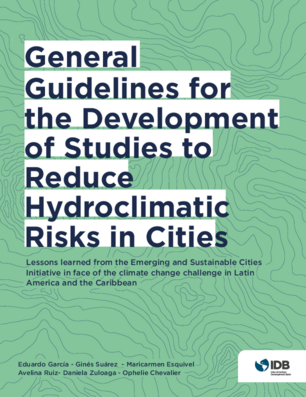General Guidelines for the Development of Studies to Reduce Hydroclimatic Risks in Cities: Lessons Learned from the Emerging and Sustainable Cities Initiative in Face of the Climate Change Challenge in Latin America and the Caribbean
Date issued
Dec 2019
Subject
Urban Infrastructure;
Climate Change Adaptation;
Urban Planning;
Climate Change Mitigation;
Drought;
Flood Damage Prevention;
Rainfall;
Hurricane;
Natural Disaster
JEL code
Q54 - Climate • Natural Disasters and Their Management • Global Warming;
Q56 - Environment and Development • Environment and Trade • Sustainability • Environmental Accounts and Accounting • Environmental Equity • Population Growth;
O18 - Urban, Rural, Regional, and Transportation Analysis • Housing • Infrastructure;
R11 - Regional Economic Activity: Growth, Development, Environmental Issues, and Changes;
R14 - Land Use Patterns;
R58 - Regional Development Planning and Policy;
D81 - Criteria for Decision-Making under Risk and Uncertainty
Category
Monographs
Urban conglomerates concentrate risks and opportunities for more than 80% of the population in Latin America and the Caribbean (LAC), and they constitute appropriate analysis units to conduct studies on natural disaster risks. This document provides guidelines to conduct quantitative and probability analyses of risks associated with hydroclimatic phenomena and climate change in cities: coastal, riverine and extreme pluvial flooding, hurricanes, winds, beach erosion, and urban drought. A large part of the methodology presented has been applied in the Emerging and Sustainable Cities Initiative (ESCI) of the Inter-American Development Bank - a pioneering program developed from 2011 to 2018. This document provides multiple practical examples taken from the work done as part of the above-mentioned initiative. Building on the experience gathered over several years conducting disaster risk and climate change vulnerability analyses in emerging cities of the region, this document systematizes the lessons learned from these studies in a set of methodological guidelines that may help guide future studies, including a number of best practices for incorporating information from climate change scenarios.
Generative AI enabled




